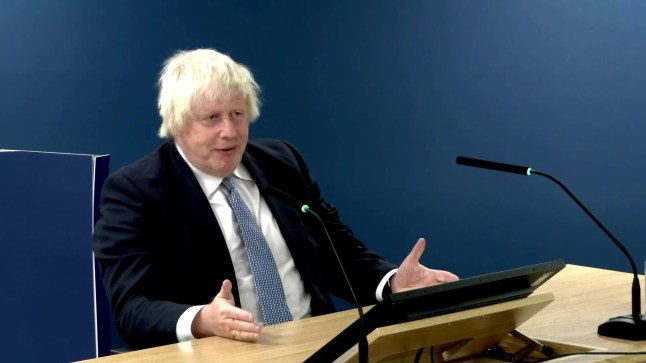Boris Johnson admits he was slow to ‘full horror’ of Covid’s impact on kids


Boris Johnson has told the Covid-19 inquiry that his government was ‘slow’ to realise the ‘full horror’ of the pandemic’s effect on British children.
The former Prime Minister is the latest witness to be called in front of the committee, which is now in its third year of investigating the UK’s response to the crisis.
Its latest phase focuses on the impact of policies such as school closures and social distancing on the country’s young people.
In his evidence to the inquiry, Johnson highlighted that government officials and medical experts did not know how the virus would affect children early in the pandemic.
He said: ‘We didn’t know much about the transmissibility of the disease.
Sign up for all of the latest stories
Start your day informed with Metro’s News Updates newsletter or get Breaking News alerts the moment it happens.
‘There were all sorts of things that were simply unknown and difficult to plan for.’
The ex-PM said he does ‘regret very much’ the widely criticised model for replacing school exams in summer 2020, when education had been massively disrupted by lockdown.
Johnson told the inquiry: ‘We had to find a way of adjudicating on the academic achievement of the kids that didn’t involve an exam.
‘And Ofqual came up with this system. I was not expert enough to comment on it, on whether it was viable or not, but plainly it let down a lot of kids whose grades didn’t reflect their abilities and their achievements.’
However, he added: ‘What I would say in our defence is it wasn’t easy to come up with the right model.’
Timeline of Covid disruption on schools
March 18 2020: Boris Johnson announces schools in England will close their doors in just two days’ time. Similar announcements are made in the rest of the UK
June 1: The first group of students begin returning to school in England. Wales holds on until the end of the month, while Scotland and Northern Ireland wait until August
June 15: Johnson rejects footballer Marcus Rashford’s call for free school meal vouchers to be extended through the summer holidays – then U-turns the next day
August 4: Scottish exam results, based on teacher-assessed grades but decided by algorithm, are published with widespread backlash
August 11: Scotland backtracks and gives students the better grade between the algorithm and teacher-assessed options
August 13: English A-level results are published, with 40% of teacher-assessed grades lowered. Education Secretary Gavin Williamson says there will be no U-turn
August 17: Williamson U-turns, blaming Ofqual for the turmoil before declaring ‘full confidence’ in the regulator two days later
September: Schools returned for all year groups after the lockdown
December 30: Announcement that some schools will stay closed after the Christmas break to allow for mass testing to be set up
January 4: Some schools return, but Johnson announces all schools and colleges will close from January 5 until at least February 22
February 22: Phased reopening of schools begins in Scotland and Wales – it is held off in England and Northern Ireland until March 8. Exams are cancelled again
He later said the approach ‘was very undermining for the confidence of kids who thought they deserved a better grade, and it was a bad system’.
The Covid inquiry also heard Johnson had considered sacking his Education Secretary Sir Gavin Williamson over the fiasco.
Messages were shown, in which he told his then-chief advisor he was in his official residence at Chequers and ‘in a thoroughly homocidal mood’.
But Johnson paid tribute to Sir Gavin’s work this morning, saying: ‘I think if I look back at my handling of my beloved colleagues over the three-and-a-bit years I was in government, I can think of all sorts of changes I might have made.
‘But I don’t think there’s any point in speculating about it now, except I think that on the whole, given the difficulties that we faced, I think that the department under Gavin did a pretty heroic job in trying to cope with Covid, and that was my judgment.’
Get in touch with our news team by emailing us at webnews@metro.co.uk.
For more stories like this, check our news page.



